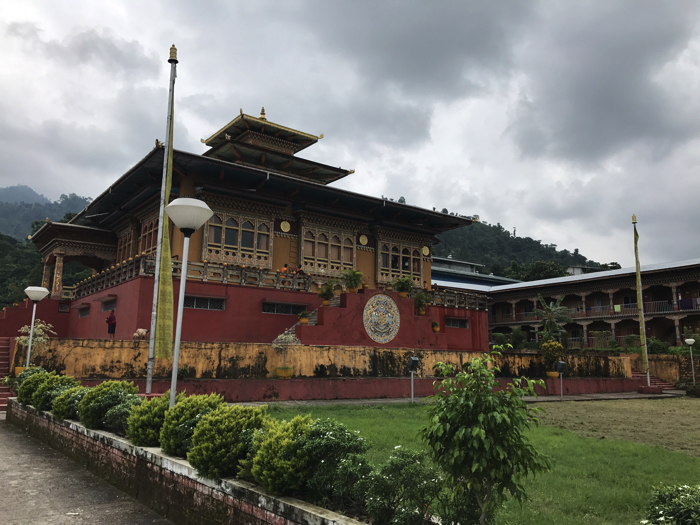- Project Leader : Imanaka Yuichi (Kyoto University, Graduate School of Medicine)
- Collaborators : Segawa Hiromi (Kyoto University, Graduate School of Medicine)
- : Sakamoto Ryota (Kyoto University, Center for Southeast Asian Studies)
- : Sonia Pilar Suguimoto Watanabe (Kyoto University, Faculty of Medicine)
- : Chencho Dorji (KGUMSB, Public Health Department)
- : Sither Dorji (KGUMSB, Faculty of Medicine)
- : Pemba Yangchen (Ministry of Health in Bhutan, Public Health Department)
- : Kunzang Dorji (KGUMSB, Public Health Department)
- : Ugyen Wandhi (KGUMSB, Public Health Department)
- : Chimi Dema (Ministry of Health in Bhutan, RangaytungBasic Health Unit)
- : Yankha Dorji (Ministry of Health in Bhutan, Phuntholing Hospital)
- : Sonam Zangmo (Ministry of Health in Bhutan, Gelephu Hospital)
Outline of Research
Building upon the Gross National Happiness (GNH) concept, in this study, we will try to develop a Non Communicable Diseases (NCD) prevention intervention model (based on school health education and using a group dynamics method for health education and health check-ups), trial intervention, and evaluation. Using a questionnaire and health check-up, we will measure the social requirements and the risk recognition level (questionnaire form), behavioral risk factors (questionnaire form and diet and exercise record), and biological factors (BMI, abdominal girth, urine Na / K value, urine Glu, blood Glu, HbA1c, blood Cre, occasional blood sugar, body fat, blood pressure) in each setting.
We will use the data of WHO NCD step survey and GNH survey to analyze the differences in residential areas and the correlation of NCD prevalence, health care costs, and happiness to inform intervention strategies.
Description
We will try to create an intervention model that promotes health education in the entire community and evaluate the effectiveness of intervention models through diverse socio-cultural factors, risk recognition levels, behavioral points, biological factors, and factors that influence happiness. By analyzing differences by residential area and correlation of NCD prevalence, health care cost, and happiness through the WHO NCD step survey and GNH survey, we will create a more effective intervention model and contribute to the establishment of measures to prevent NCD in the Kingdom of Bhutan. The qualitative survey (PHASE 1) in FY 2017 indicated that there is a need for practical health education, while enhanced school health, community unit intervention, and cooperation with religious authorities would be effective. Based on this result, we will study and prepare an intervention model of NCD prevention and counter measures that are adapted to the social and cultural background of Bhutan.
According to the World Health Organization (WHO 2015), NCD kill 38 million people each year; nearly three quarters of NCD deaths (28 million) occur in low- and middle-income countries. About 16 million NCD deaths occur before the age of 70 and about 82% of these “premature” deaths occur in low- and middle-income countries. Increasing NCD rates are creating a greater economic burden on individuals, families, societies, and the world. The government of Bhutan has made it a top priority to develop measures against NCD since they are a large social burden for the nation.
Bhutan has experienced rapid economic development and the opening up of internet information access in a short time. The social changes are very dramatic. The lifestyle of Bhutanese people is changing rapidly, and NCD risks related to lifestyle are increasing along with inactivity, intake of excess fatty and salty food, intake of excess high-carbohydrate food, unlimited intake of alcohol, cigarette smoking, intake of processed foods, and increasing occupational stress. The Bhutanese government is tackling NCD prevention, but is still developing procedures.
The Bhutanese national development guideline is based on the philosophy of Gross National Happiness (GNH), which aspires to achieve happiness for all, but is challenged by factors related to lifestyle, dietary habits, behaviors, and cultural transitions that are the determinants of NCD. Therefore, in our endeavor to pursue GNH, health promotion actions need to be directed toward behavior and lifestyle modifications with evidence-based interventions that are more effective in preventing and reducing NCD, so that people can enjoy better health and happiness.
To date, there has been no intervention study on NCD in Bhutan. Moreover, GNH is a unique concept in the world that covers Sustainable Development Goals (SDGs), even though GNH was established before the SDGs.
 School of trainee monks |
 Dish in southern Bhutan |
